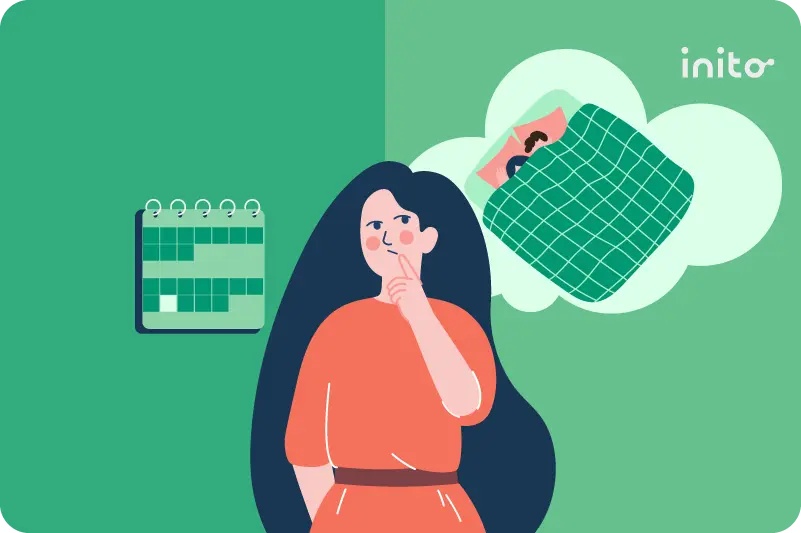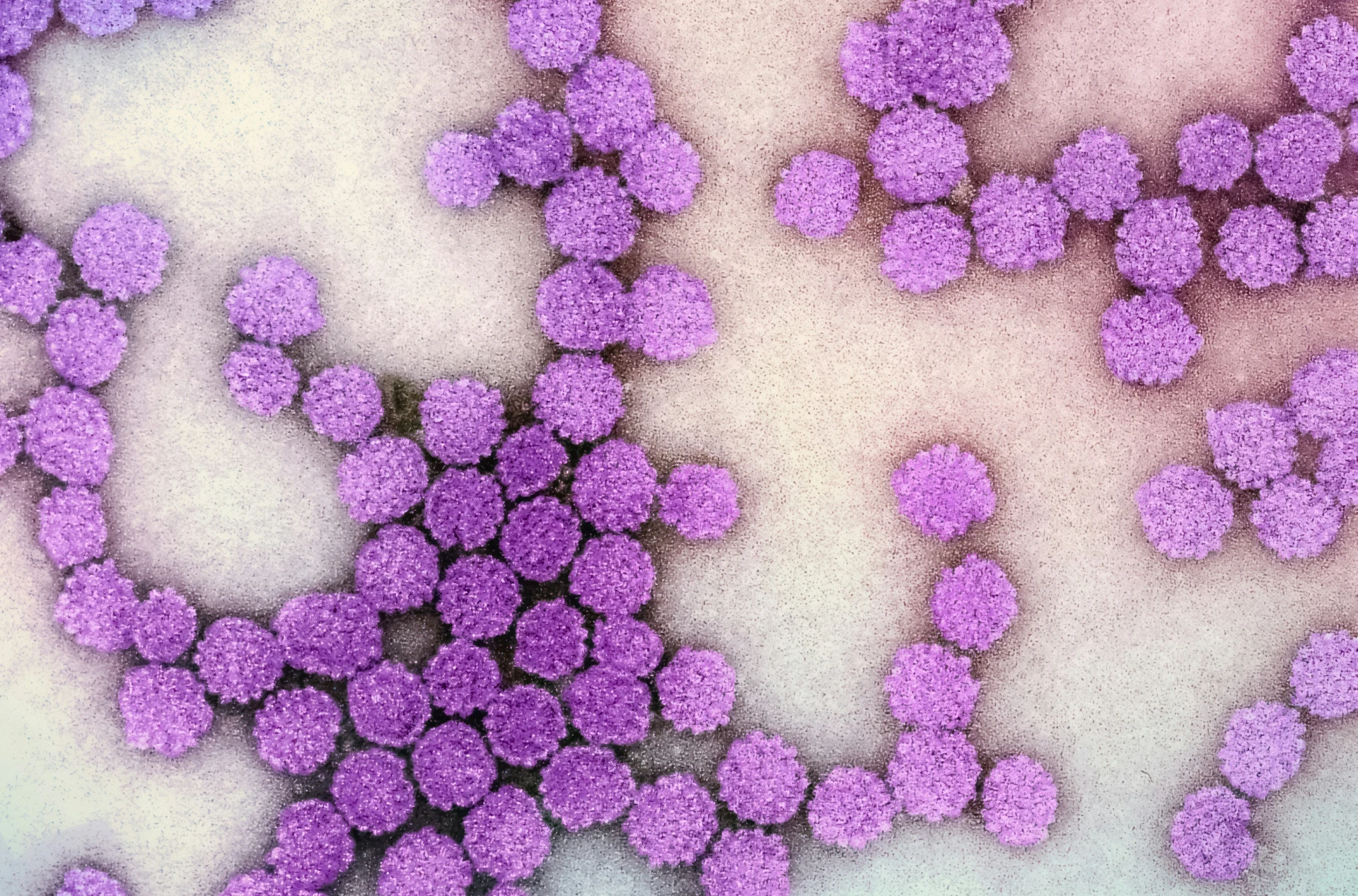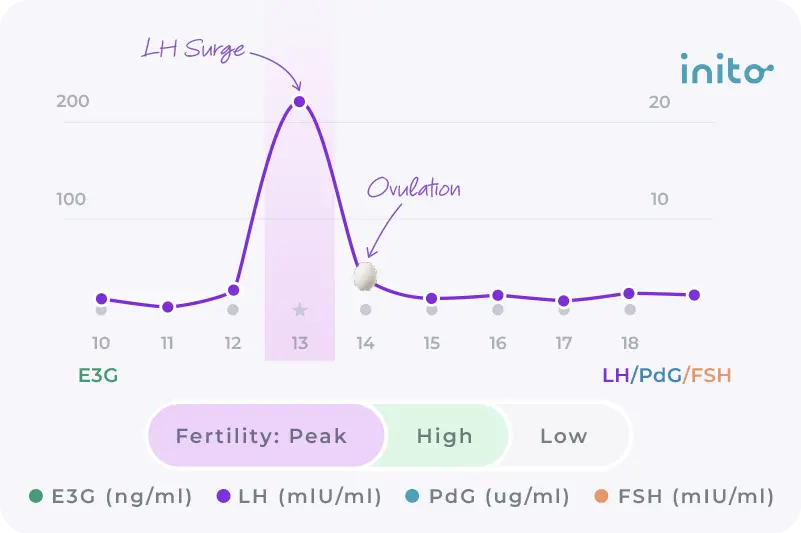Content table
Does sex delay your period?
This is a common question, especially if you’re waiting for your period to show up and it doesn’t.
TL;DR: Sex can slightly affect your period, but it’s not the main reason you may see changes in your menstrual cycle.
It’s your hormones that are responsible for the fluctuations in your menstrual cycle. And research shows that 69% of women see a variation of up to 6 days in their period length.
So, if you’re wondering why your period is hiding, it’s more likely to be a result of hormonal shifts due to stress, diet, weight fluctuations, illness, or other factors.
Understanding this can help alleviate anxiety and help you plan your life around your menstrual cycle.
Let’s dive deeper into the relationship between sexual intercourse and your menstruation. We will also explore other common period-related questions.
Key takeaways
- Sex can cause slight changes in your periods, but your cycle isn’t going to be the exact same every month anyway.
- Hormones are the main reason for shifts in your menstrual cycle.
It’s common for periods to vary by up to 7 days. - Your hormones influence both your sex drive and your menstrual cycle. This means that your sex drive changes throughout your cycle.
- Unprotected sexual intercourse during your peak fertility days can lead to pregnancy.
- Tracking your cycle is the best way to understand your cycle variations. This can help you identify irregularities.
- Talk to a healthcare provider if you notice significant changes in your period.
- Stress, birth control, illness, exercise, weight changes, eating disorders, and medical conditions can delay menstruation.
Does sex affect periods?
Yes, sex can indirectly affect your period, but it’s not the leading cause of variations in your menstrual cycle.
Hormones are what actually dictate your menstrual cycle and your period.
Hormones have an indirect effect on your libido too. Here are some fluctuations in libido you may notice during your menstrual cycle:
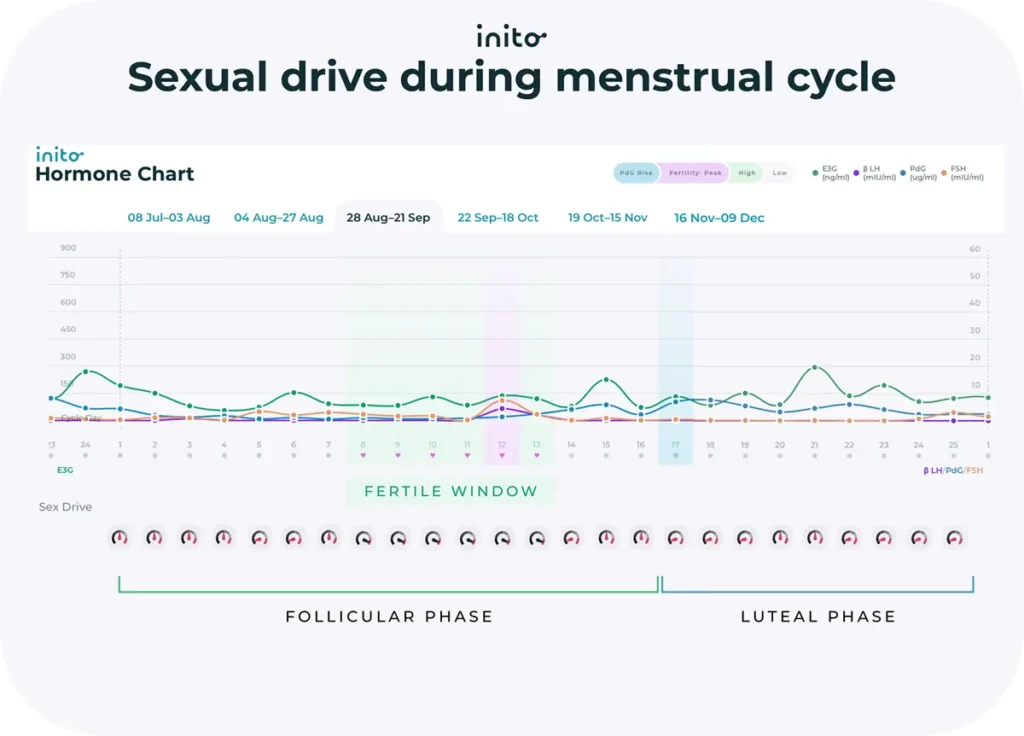
- Low sex drive: During your period
- Increased sex drive: During the latter half of the follicular phase and around ovulation, when estrogen levels peak and the mature egg is released
- Decreased sex drive: During the luteal phase, post-ovulation
Low libido | Period |
Increased libido | Ovulation, when estrogen peaks |
Decreased libido | Luteal, post-ovulation |
Interestingly, hormones released during and after sex can influence your menstrual cycle. One study found that regular sexual activity with your partner might lead to more regular periods.
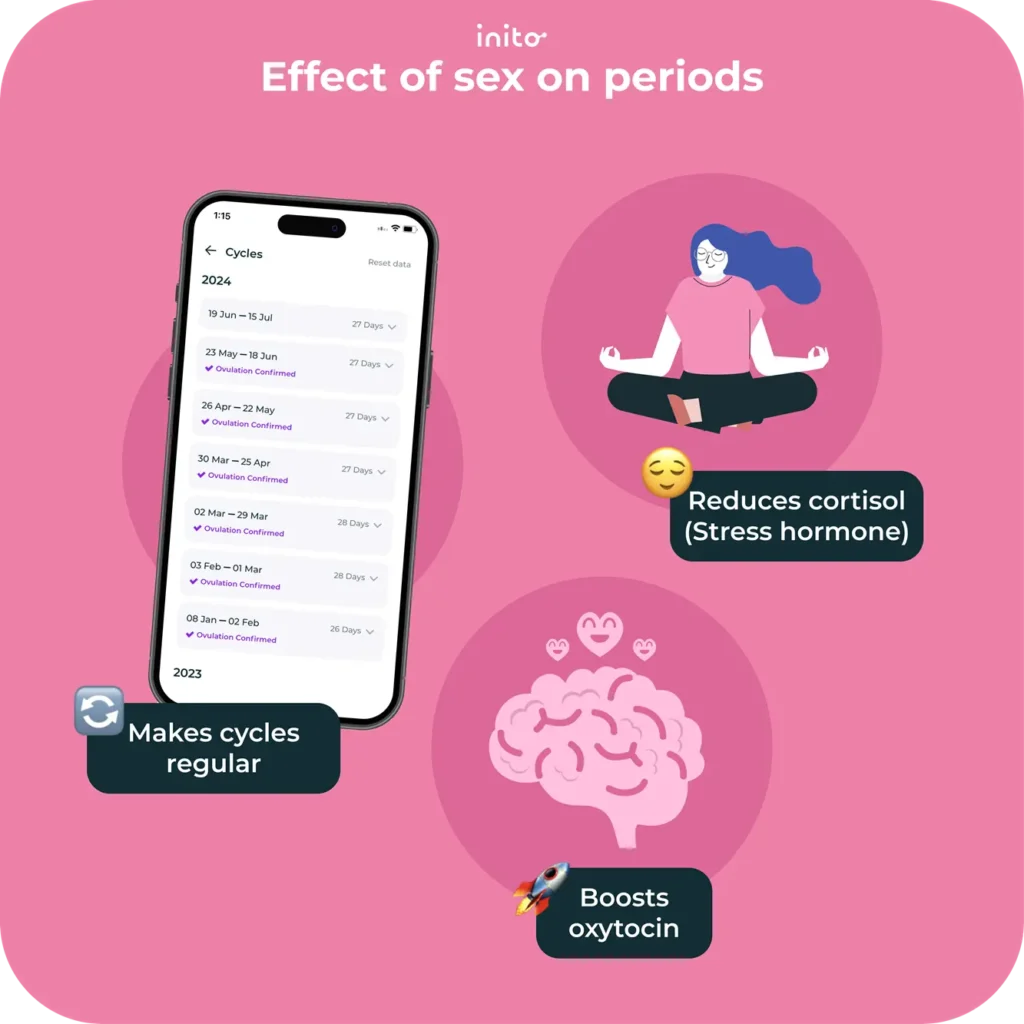
One hormone that’s affected by sex is cortisol — the stress hormone.
Research shows that sexually active women usually have lower cortisol levels. This is great news for fertility and menstrual cycles. The female orgasm (involuntary muscle contractions) causes the release of oxytocin, another hormone that reduces stress and affects fertility.
So your sexual habits and your period are interconnected. While intercourse can cause slight variations in your menses, it’s okay for your cycle to vary naturally.
Know your chances of Ovulation!
Take our ovulation quiz to understand how your hormone patterns and
lifestyle factors may affect your chances of ovulating
Does sex delay your period?
Technically, yes. Sex can slightly affect your period.
But again, it’s not the main reason for changes in your menstrual cycle. Plus, it’s normal for your cycle length to vary from month to month.
In fact, about 46% of women experience a variation in cycle length of at least 7 days.
Can having sex two days before your period delay it?
No.
Being sexually active two days before your period won’t delay menstruation. If your period is delayed, it’s not due to sexual activity. It’s due to other factors like hormones or stress.
However, if you have sex during your fertile window, there’s a high chance of getting pregnant.
If you were sexually active around your ovulation day, then a delay in the day your period starts may mean you’re pregnant.
Your ovulation day hits about 12-14 days before your next period. So, time your sexual intercourse to increase your chances of conception if you’re trying to conceive.
But, how do you know when you’re ovulating?
The Inito Fertility Monitor can help with that. This monitor measures all four fertility hormones in a single test strip. That includes:
- Luteinizing Hormone (LH)
- Estrogen
- PdG (urine metabolite of progesterone)
- Follicle-Stimulating Hormone (FSH)
The easy-to-use Inito app provides charts and graphs that allow you to know when you’re ovulating. And by tracking PdG, you can confirm ovulation.
If you had sex around the time of ovulation and your menstruation is late, take a pregnancy test to confirm.
Here’s a table to help further explain the timing of sexual activity and its potential effect on your next period.
When did you have sex? | Can your period get delayed? | Reason |
1-7 days before period | No | Sex can alter your hormones, but it won’t delay your period. |
7-11 days before period | No | Sex can alter your hormones, but it won’t delay your period. |
12-14 days before your period | Yes | Could be your fertile window (you ovulate 12-14 days before your fertile window) |
> 14 days before your period | Yes | Could be your fertile window – your fertile window comprises of 4 days before ovulation, the day of ovulation, and the day after ovulation |
Does sperm delay your period?
No, sperm alone does not delay your period. But if you have unprotected sex when you’re most fertile, you can get pregnant.
That’s because sperm can live inside the female reproductive tract for up to five days. If you have shorter menstrual cycles and have period sex, your chances of conception increase.
Why?
If you have short menstrual cycles, your fertile window starts early. This means your most fertile days could begin when your period does.
And, because sperm can last for up to 5 days inside your body, you could get pregnant.
Can your period be late after having sex for the first time?
Yes, if you’re new to being sexually active, it can affect your period.
Thanks to the slight changes in your hormonal levels, which shift your menstrual cycle.
Stress is something people sometimes feel in their first sexual experience, so that can influence your menses, too.
But keep a close eye on your period and note if it varies more than 7 days. Talk to a healthcare professional if you notice any sudden changes in your cycle.
I had protected sex and my period is late - what do I do?
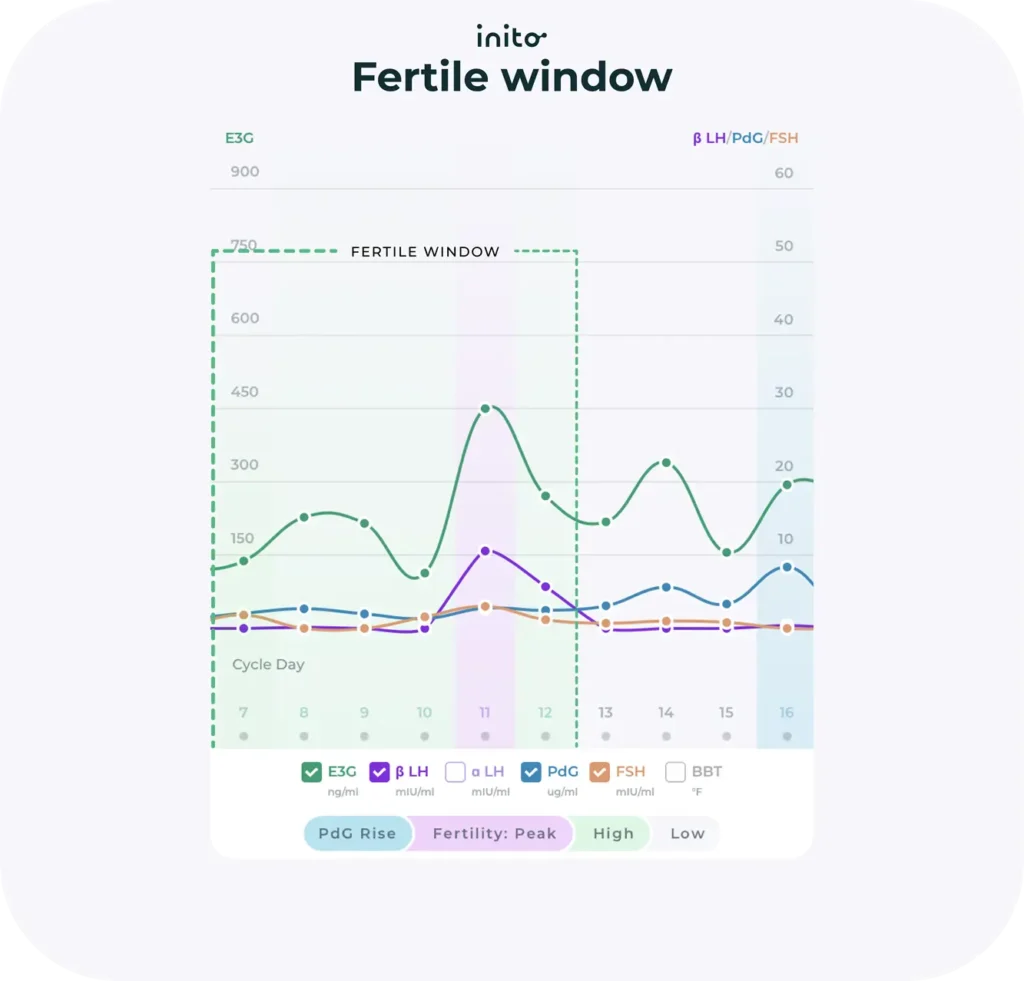
If you have intercourse during your fertile window and your birth control method fails, you could get pregnant. But, if you have sex outside of your fertile window, it’s less likely.
If your menses is late by a few days, it usually doesn’t mean anything. But if it is several days late, take a pregnancy test.
Why is my period late?
Tracking your period can help you understand what’s considered “normal” for you. Remember that it’s okay if menstruation is delayed by a day or two.
Menstrual cycles are between 21 and 35 days, but many women have longer or shorter cycles.
If your menses is late and you know you’re not pregnant, here are some reasons why:
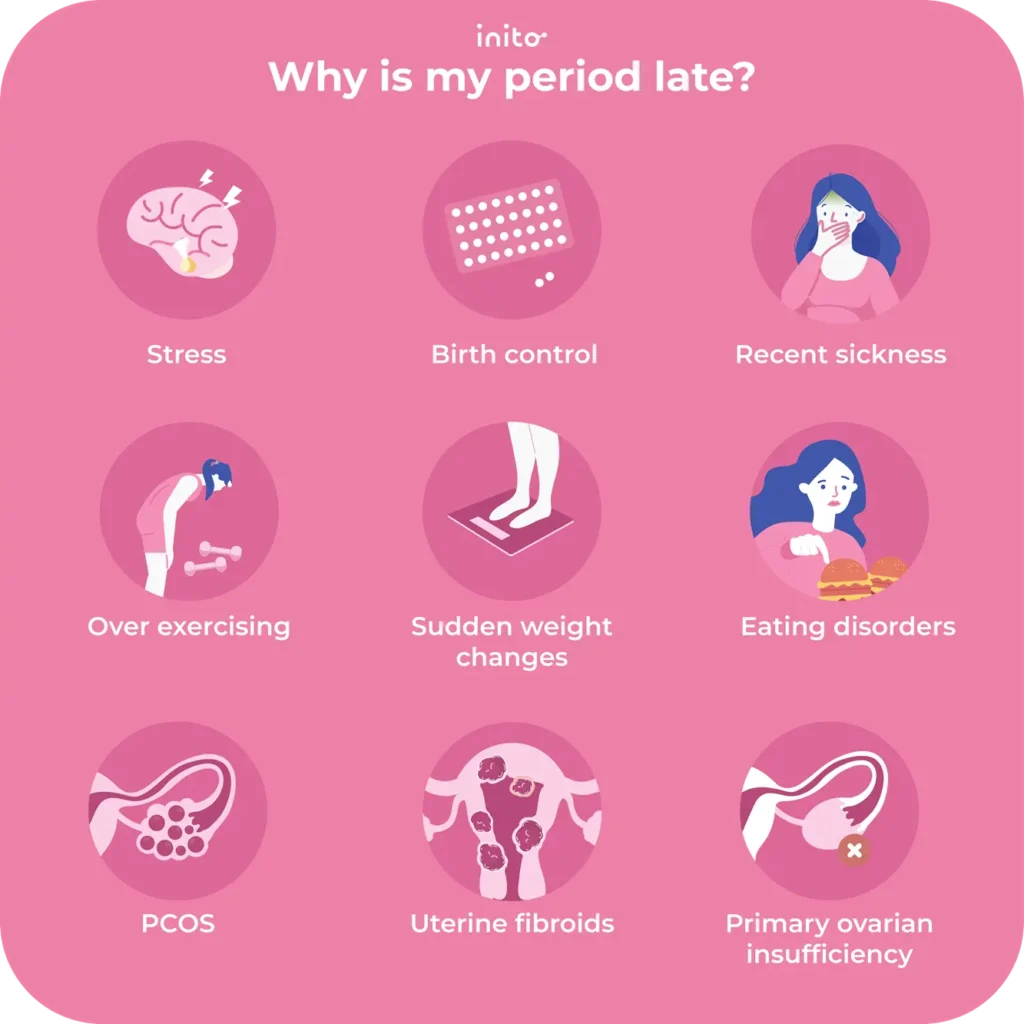
Stress
Hormones related to the fight-or-flight mode can affect your cycle and prevent you from having your period. Anxiety can also cause anovulation, the #1 cause of infertility.
Prescription birth control
Some types of birth control can make your period late, or skip it entirely. Using birth control for a long time can sometimes make menstruation lighter. And some studies show birth control can stop your period entirely.
Recent sickness
Getting sick can sometimes delay your period. This is because your body focuses all its attention and efforts on fighting the illness.
If you’re taking medicine while sick, this can also affect the start date of your menstruation.
Over-exercising
If you exercise too much, you might stop having your period. This is called exercise-induced amenorrhea. It can happen because your body is under too much pressure. Cortisol suppresses your reproductive hormones and can prevent ovulation and menstruation.
Sudden weight changes
Losing or gaining weight quickly puts excess pressure on your body. These weight fluctuations cause cortisol levels to rise, thus affecting ovulation and making your period irregular.
Eating disorders
When your body’s not getting proper nutrition, it prioritizes survival over reproduction. Binge eating and self-starvation can lead to missing your ovulation and your period.
Polycystic Ovary Syndrome (PCOS)
Women with PCOS often experience longer or irregular menstrual cycles. This is because the high androgen levels prevent women from ovulating and menstruating regularly.
Know more: Get Pregnant with PCOS: Your Complete Guide
Uterine fibroids
These non-cancerous tumors are the most common benign gynecological tumors in women worldwide. They can cause heavy bleeding, irregular menses, and even missed periods in some women.
Know more: Can I Get Pregnant with a Fibroid and If So, How?
Primary Ovarian Insufficiency (POI)
It’s rare, but some women can stop having periods before they turn 40. This is called Primary Ovarian Insufficiency (POI). The risk of this is very low, however. It happens in less than 1% of women under 40.
If your period is late by a few days, it usually isn’t cause for concern. But if you miss your period for three or more menstrual cycles, that’s called amenorrhea. And it means it’s time to talk to your doctor.
If you notice anything unusual with your period, seeing a healthcare professional is always a good idea.

FAQs
There is no scientific proof that sexual activity can jump-start a late period. If your period is late, it’s likely due to hormones, stress, diet, or other factors. So focus on balancing your hormones, reducing your distress, and eating your diet to help regulate your period.
If you’ve missed your period three times in a row or if your periods are consistently more than 35 days apart, talk to a healthcare provider.
Here are some things you can do to help manage delayed periods:
- Reduce stress
- Consider finding an alternative birth control to pills
- Boost immunity to prevent sickness that can affect period start date
- Participate in regular exercise that doesn’t push your body too far
- Stabilize weight by eating a healthy diet and exercising regularly and in a healthy way
- Make sure you’re giving your body the proper nutrients through your diet
- Talk to your doctor if you’re experiencing delayed periods for more than 3 cycles
If you’ve missed your period, it means your period is irregular. This can affect your fertile window and ovulation.
If you’re trying to prevent pregnancy, you want to use contraception if you missed your period.
If you are trying to conceive, there’s no guarantee that sexual activity after a missed period will end in conception.
It’s okay for periods to be a few days late. A “normal” menstrual cycle ranges anywhere between 21 days and 35 days.
However, if your menses is more than 7-9 days late if it’s typically regular, it is considered a “late” period. And you may want to talk to your doctor if you miss your period more than 3 times in a row.
Your menstruation may be late after sex due to hormonal changes, anxiety, or other factors including:
- Birth control pills
- Recent sickness
- Over-exercising
- Sudden weight changes
- Eating disorders
- PCOS
- Uterine fibroids
- POI
If you had unprotected sex a week before your period and your menses is delayed, it doesn’t necessarily mean that you’re pregnant.
Ovulation typically occurs 12-14 days before your period, which is when the chances of pregnancy are the highest. So if you have regular cycles, the chances of pregnancy after sex one week before your period are quite low.
However, if you have irregular cycles, your ovulation day becomes unpredictable. In such cases, you can take a pregnancy test to confirm.
Yes. Birth control can affect your periods in many different ways including:
- Missed menses
- Longer or shorter
- periods
- Heavier or lighter menstrual blood
- Spotting
- Irregular bleeding
Was this article helpful?
- Menstrual Cycle Length and Patterns in a Global Cohort of Women Using a Mobile Phone App: Retrospective Cohort Study | PubMed Central
- The Normal Menstrual Cycle and the Control of Ovulation | NIH
- Ask the Sexpert: Sex drive and the menstrual cycle | University of Rochester
- Sexual behavior frequency and menstrual cycle length in mature premenopausal women | ScienceDirect
- The Menstrual Cycle and Sexual Behavior: Relationship to Eating, Exercise, Sleep, and Health Patterns | Taylor & Francis Online
- Roles of Oxytocin in Stress Responses, Allostasis and Resilience | PubMed Central
- What ovulation signs can I watch for if I want to get pregnant? | Mayo Clinic
- Sperm selection in natural conception: what can we learn from Mother Nature to improve assisted reproduction outcomes? | Oxford Academic
- Oral Contraceptive Pills | NIH
- Effects of intensive training on menstrual function and certain serum hormones and peptides related to the female reproductive system | Medicine
- Association between Body Weight Changes and Menstrual Irregularity: The Korea National Health and Nutrition Examination Survey 2010 to 2012 | PubMed
- Binge eating and menstrual dysfunction | ScienceDirect
- Long and irregular menstrual cycles, polycystic ovary syndrome, and ovarian cancer risk in a population-based case-control study | Wiley Online Library
- Understanding the Impact of Uterine Fibroids on Human Endometrium Function | Frontiers
- Menopause Review | Termedia



